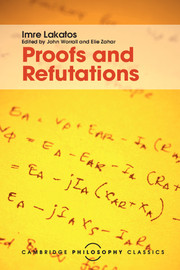Book contents
Editors’ preface
Published online by Cambridge University Press: 05 November 2015
Summary
Our great friend and teacher Imre Lakatos died unexpectedly on 2 February 1974. At the time he was (as usual) engaged on many intellectual projects. One of the most important of these was the publication of a modified and extended version of his brilliant essay ‘Proofs and Refutations’, which appeared in four parts in The British Journal for the Philosophy of Science, 14, 1963–4. Lakatos had long had a contract for this book, but had held back publication in the hope of amending and further improving the essay, and of adding to it substantial extra material. This work was considerably delayed by the diversion of his interests to the philosophy of physical science, but in the summer of 1973 he finally decided to go ahead with the publication. During that summer we each discussed plans for the book with him, and we have tried to produce a book which, in the sadly changed circumstances, is as similar as possible to the one then projected by Lakatos.
We have thus included three new items in addition to the original ‘Proofs and Refutations’ essay (which appears here as Chapter 1). First we have added a second part to the main text. This concerns Poincaré's vector-algebraic proof of the Descartes–Euler conjecture. It is based on chapter 2 of Lakatos's 1961 Cambridge Ph.D. thesis. (The original ‘Proofs and Refutations’ essay was a much amended and improved version of chapter 1 of that thesis.) A part of chapter 3 of this thesis becomes here appendix 1, which contains a further case-study in the method of proofs and refutations. It is concerned with Cauchy's proof of the theorem that the limit of any convergent series of continuous functions is itself continuous. Chapter 2 of the main text and appendix 1 should allay the doubt, often expressed by mathematicians who have read ‘Proofs and Refutations’, that, while the method of proof-analysis described by Lakatos may be applicable to the study of polyhedra, a subject which is ‘near empiricaL' and where the counterexamples are easily visualisable, it may be inapplicable to’ reaL' mathematics. The third additional item (appendix 2) is also based on a part of chapter 3 of Lakatos's thesis. It is about the consequences of his position for the development, presentation and teaching of mathematics.
- Type
- Chapter
- Information
- Proofs and RefutationsThe Logic of Mathematical Discovery, pp. ix - xiPublisher: Cambridge University PressPrint publication year: 2015



